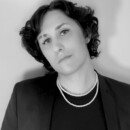torrin a. greathouse
Poetry

- Biography
Biography
torrin a. greathouse is an award-winning transgender cripple-punk poet and essayist. She received her MFA in creative writing from the University of Minnesota. Their work has been featured in Poetry Magazine, The Rumpus, the New York Times Magazine, Cooper Nickel, The Kenyon Review, and elsewhere. She has received fellowships from the National Endowment for the Arts, the Effing Foundation for Sex Positivity, Zoeglossia, The Ragdale Foundation, and the University of Arizona Poetry Center. She is the author of DEED (Wesleyan University Press, 2024), winner of a 2025 Stonewall Book Awards Barbara Gittings Prize in Poetry, and Wound from the Mouth of a Wound (Milkweed Editions, 2020), a Minnesota Book Award and CLMP Firecracker Award finalist, and winner of the 2022 Kate Tufts Discovery Award. She teaches at the Rainier Writing Workshop, the low-residency MFA program at Pacific Lutheran University.
Mentor. Workshops and classes in poetry.
Statement: In his lecture A Seduction: Metaphor and the Come Hither, Tim Seibles writes “If poetry is a fire in the mind, then metaphor is an accelerant and poets are arsonists.” Whether a writer intends this fire to provide warmth or to burn something down, my goal as a teacher and mentor is to provide them with the tools necessary to stoke that flame. Meeting students’ writing on its terms and through the lens of their own individual poetic canons, rather than a monolithic notion of craft, I hope to draw out the best and bravest versions of their work. I encourage writers to court failure in their writing process, treating each draft as a space for experimentation, for excess, and for bold choices they might otherwise never make.In the creative writing classroom, I aim to rethink and decenter traditional approaches to the workshop, which structurally privilege a small set of identities and formal approaches. Integrating critical interventions by Arielle Greenberg and Felicia Rose Chavez, I use an alternative workshop pedagogy that engages each writer in shaping the structure of the workshop. This approach, rather than silencing the writer, places them in direct dialogue with their fellow writers while providing them with the freedom to ask for the kind of feedback that their work requires.



Social Media